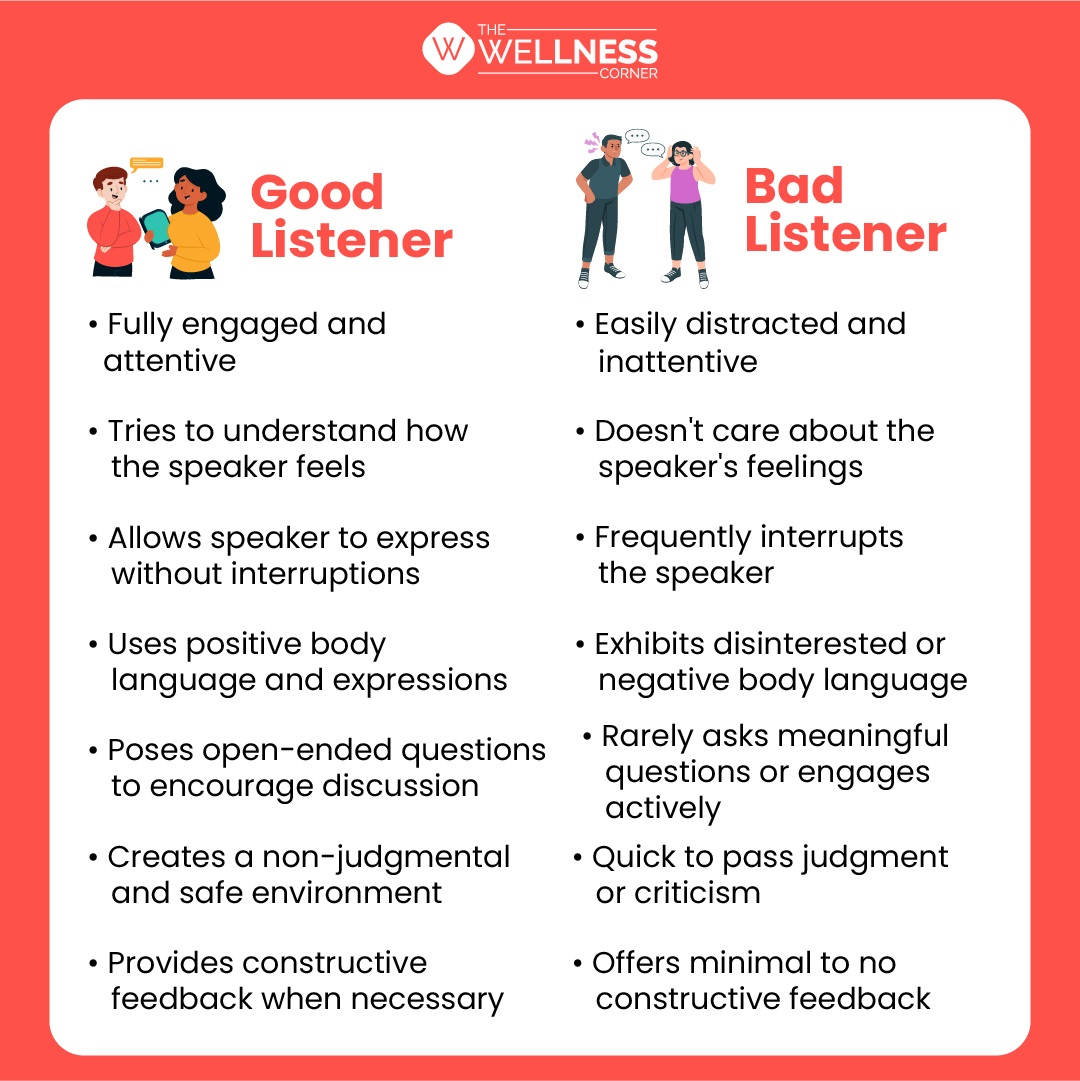Are You Truly Listening? Signs You Might Be A Bad Listener
27 months ago
4 minute read.

Think about the last time you had a conversation - were you present in the moment, hanging onto every word, or were you mentally crafting your response before the other person had even finished speaking?
Sitting in a bustling café, sipping your favorite coffee, while your friend enthusiastically shares their latest adventure. Their words blend into the café's background noise as your mind drifts away to your world - did you turn off the stove at home? Wait, what was your friend saying again?
We've all been there, unintentionally falling into the trap of being a bad listener. It's like zoning out during a movie and missing a crucial plot twist – except this time, the story is about building connections, understanding, and empathy. If you've ever felt disconnected in a conversation or realized you're not truly hearing what others are saying, you're not alone.
Also check: Active Listening Directory
Signs you're a bad listener
If you're concerned that your listening skills are weak — or simply want to improve — here are some signs of poor listening to be aware of:
1. Interrupting frequently
When you interrupt, you are essentially prioritizing your thoughts over theirs, conveying the message that what you have to say is more important. This behavior disrupts the flow of conversation and also hinders the speaker's ability to express themselves fully. To become a better listener, practice restraint and let the speaker conclude before sharing your thoughts.
2. Talking more than your partner
If you find that you dominate conversations by talking more than your partner, you're likely not allowing them the opportunity to contribute fully. This behavior can stem from a desire to share your own stories or thoughts, but it can inadvertently overshadow what the other person wants to convey. To address this, make an effort to give your partner the chance to speak. Ask open-ended questions, encourage them to share, and actively listen to what they have to say.
3. Selective hearing
This selective hearing can create misunderstandings and lead to incomplete conversations. To counteract this habit, challenge yourself to actively engage with viewpoints that differ from your own. Approach conversations with a willingness to learn, even if the topic isn't naturally appealing to you. This approach not only broadens your perspective but also demonstrates your commitment to being a more attentive listener.

4. Offering immediate solutions
Sometimes, people just need a listening ear, a chance to express their thoughts and emotions without feeling pressured to accept immediate solutions. To address this, strive to validate the speaker's feelings before offering any advice. Phrases like "I understand how you're feeling" or "That sounds challenging" convey your empathy and create a more supportive environment for the conversation to unfold.
5. Lack of empathy
Listening isn't just about hearing words; it's about grasping the emotions, concerns, and perspectives that underlie those words. To enhance your empathy, practice active listening techniques such as mirroring the speaker's emotions or asking open-ended questions to encourage them to share more about their feelings. By acknowledging their emotions, you create a safe space for meaningful discussions.
Also check: Strategies that can help you enhance your people skills

Strategies to improve your listening skills
Improving your listening skills is crucial for effective communication and building strong relationships. Here are some strategies to help you enhance your listening abilities:
- Be present: Pay close attention to the speaker. Disconnect from distractions like phones, laptops, and other electronics. Maintain eye contact and show through your body language that you are engaged in the conversation.
- Active listening: Focus on what the speaker is saying, not just waiting for your turn to talk. Show that you are actively engaged by nodding, using verbal cues like "I see," "I understand," and providing occasional verbal acknowledgments.
- Avoid interrupting: Before responding, let the speaker finish their thought. Interrupting can break the speaker's flow and make them feel unheard.
- Ask open-ended questions: Encourage the speaker to share more by asking open-ended questions that can't be answered with a simple "yes" or "no." It shows that you're interested in their perspective.
- Paraphrase and reflect: Summarize the speaker's points in your own words to ensure you understand correctly. Reflect on their emotions as well. It confirms your understanding and lets the speaker know you're truly listening.
- Avoid judgments: Suspend judgment and avoid forming opinions while the speaker is talking. Listen with an open mind, even if you disagree with their viewpoint.
- Practice empathy: Evaluate the situation from the speaker's point of view. It helps you connect deeply and understand their feelings and motivations.
Conclusion
Being a good listener is a vital skill that can transform your relationships and interactions. By recognizing the signs of bad listening habits and implementing these strategies, you can evolve into a more attentive and empathetic listener. Remember, it's a journey that requires patience and consistent effort, but the rewards of improved communication and deeper connections are undoubtedly worth it.
Leave a Comment
Related Articles
Health Checks @ Home
Service
Explore
© 2025 Truworth Health Technologies Pvt. Ltd.




